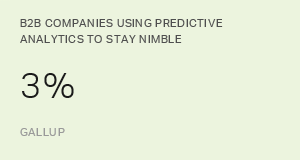Story Highlights
- Keeping promises to your customers is your most important job
- There are three strategies to make sure you deliver on brand promises
Does your company make good on its promises?
You might think it does, but do your customers agree?
Less than half (46%) of B2B customers strongly believe that the companies they do business with always deliver on their promises.
This should be unsettling for B2B leaders as brand promises profoundly influence business outcomes.
Exceptional workplaces in Gallup's database deliver on their brand promise to customers 76% of the time. These companies outperform their competitors in terms of share of wallet, profitability, revenue and relationship growth.
Engendering customer loyalty in this manner is no easy feat, but it's within reach. Here are three strategies for B2B leaders:
- Create a brand promise that wins business.
- Help employees deliver on brand promises.
- Become versed in the art of problem-solving.
1. Create a brand promise that wins business.
Brand promises that focus on products and pricing won't differentiate B2B companies as invaluable partners. Customers expect more; they want their vendors to provide cutting-edge ideas that improve business performance.
B2B companies that push the envelope and bring their customers ideas can garner trust and position themselves as true advisers.
Customers will, in turn, have stronger emotional attachments to that company -- they'll be more motivated to stick around.
Developing such partnerships demands a data-driven diagnostic approach.
B2B companies must work to understand customer needs, bring customers novel ideas and make these ideas work for the customer by tailoring them to the marketplace.
The right analytics can help B2B companies identify unseen product and service opportunities.
Qualitative, human-to-human interviews are helpful in assessing customer challenges and growth opportunities.
B2B companies should maintain an ongoing dialogue with customers in order to understand their aspirations and facilitate partnerships to realize goals.
B2B companies must work to understand customer needs, bring them novel ideas and make these ideas work by tailoring them to the customer's marketplace.
Ultimately, B2B companies that promise to help customers grow -- and follow through on that promise - create mutually beneficial B2B relationships.
2. Help employees deliver on brand promises.
Employees embody brand experiences for customers.
But B2B companies cannot simply expect employees to know what to do.
In fact, Gallup analytics show that employees across a range of industries aren't prepared to bring brand promises to life.
B2B companies should maintain an ongoing dialogue with customers to understand their aspirations and facilitate partnerships to realize goals.
B2B leaders must create a work culture in which all employees know what their company stands for and how their daily work and job expectations support brand experiences.
To this end, leaders should clearly articulate brand promises, teach them to their people and demonstrate desired behaviors.
If leaders don't illustrate how brand promises influence their decisions and goals, employees will not fully embody the company's service values.
Managers are critical for equipping and educating employees on brand promises.
Managers must ensure that their team members understand brand promises, how their roles connect to those promises and how the company expects them to support those promises each day.
Leaders should clearly articulate brand promises, teach them to their people and demonstrate desired behaviors.
Consistently reinforcing brand promises and service values is critical for maintaining a culture of brand-actualizers.
3. Become versed in the art of problem-solving.
Problems are a byproduct of doing business, and no B2B company can ensure that its employees will embody brand promises 100% of the time.
What leaders can do is get better at correcting negative customer experiences that don't live up to brand promises.
Unfortunately, less than 5% of B2B customers who experienced a problem are "very satisfied" with the way the company handled it. And there's new data to suggest this figure is even lower. According to recent database analytics, less than 1% of B2B customers were very satisfied with the way their problem was handled.
The upside is that customers who are very satisfied with the way their problem was handled are more engaged than customers who did not encounter a problem in the first place.
In other words, B2B companies that handle problems effectively can increase customer engagement.
B2B companies that have fostered deep customer relationships can draw on these connections to facilitate accurate and timely problem resolution.
To resolve problems the right way, B2B companies should rely on their in-depth knowledge of customers' businesses.
Engendering customer-centricity in this manner, B2B companies can offer service-recovery solutions uniquely tailored to their customers' cultures and business models.
In other words, B2B companies that handle problems effectively can increase customer engagement.
Of course, B2B companies should do everything in their power to prevent less-than-perfect brand experiences.
But when problems arise, resolving them in a customer-focused fashion is essential to create satisfactory resolution experiences that reinforce brand promises.
Brand promises matter.
They proclaim what a B2B company stands for, what it offers, what separates it from competitors and what makes it worthy of customers' consideration.
Leaders who foster a promise-keeping, customer-centric culture can harness a competitive edge and win customers' business in the long term.
Gallup can help you define your brand promise and deliver on it, every time:
- Learn more about Gallup's approach to customer centricity.
- Learn about the silver lining of customer problems in our on-demand webinar.
- Partner with us to make your B2B business all about the customer -- and watch your business results improve.



